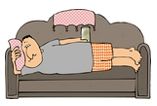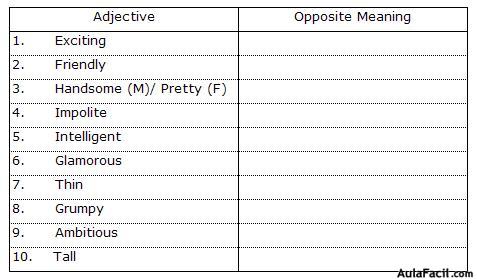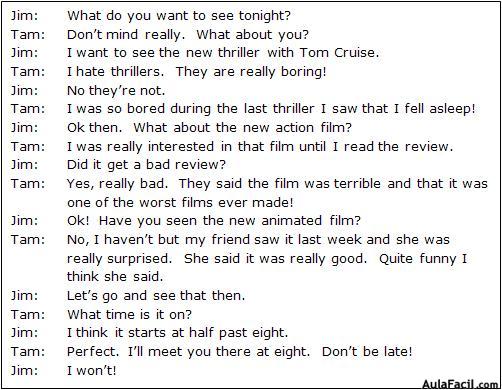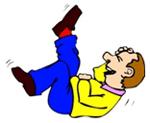The Cinema
1.- Introduction
In today’s lesson we are going to talk about the cinema. We are going to learn how to use different adjectives to describe what people look like and we are also going to learn how to describe our own feelings.
A. Match the adjectives with their opposites.

Short / Boring / Plain / Ugly / Lazy / Silly
Unfriendly / Fat / Polite / Easy-going
(Para ver respuesta hacer doble click en recuadro; un click vuelve a recuadro original)

- (M) = Masculine – normally used to describe men
- (F) = Feminine – normally used to describe women
If you don’t understand the meaning of the adjectives, please look them up in a dictionary.
B. Look at the following actors/actresses. Choose three adjectives to describe them.
| 1) |  | |
| 2) |  | |
| 3) |  | |
| 4) |  | |
Corregir
Ver Solución
Limpiar | ||
C. Listen to your teacher describe one of the actors/actresses above. Which actor/actress is she describing?
| 1) | ||
Corregir
Ver Solución
Limpiar | ||
2.- Speaking Activity
Describe your favourite actor/actress. Use some of the following words/phrases below:
- My favourite actor/actress is....
- I would describe him/her as tall/short/handsome/pretty, etc......
- In my opinion he/she is.....
3.- Listening
[Objeto Flash Eliminado] Sonido
Two friends are going to the cinema tonight. They discuss which film they want to see.
A. Which adjectives do they use to describe the following films?
| 1) | Thriller | |
| 2) | Action | |
| 3) | Animated film | |
Corregir
Ver Solución
Limpiar | ||
B. Listen again. Answer the following questions.
| 1) | Why doesn´t Tam like thrillers? . | |
| 2) | What did the review say about the action film? . | |
| 3) | What time does the animated film start? | |
| 4) | What time do they decide to meet? | |
Corregir
Ver Solución
Limpiar | ||
Check your answers!


4.- Focus on Grammar – Adjectives ed/ing
A. Look at the audio script and underline all of the adjectives.
(Para ver respuesta hacer doble click en recuadro; un click vuelve a recuadro original)



In English, when we are describing a film or expressing our own feelings, we use adjectives. However, these adjectives do not take the same form. Let’s have a look at some examples.
En inglés, cuando describimos una película o expresamos nuestras emociones, usamos adjetivos. Sin embargo, en inglés, estos adjetivos no tienen la misma forma. Vamos a ver un par de ejemplos.
B. Look at the following sentences. Do the adjectives underlined refer to the film or the speakers feeling?
| 1) | I hate thrillers. They are really boring! | |
| 2) | I was so bored during the last thriller. | |
| 3) | They said the film was terrible. | |
| 4) | She was really surprised. | |
Corregir
Ver Solución
Limpiar | ||
5.- Rules for ed/ing adjectives
A. Complete the following rule for ed/ing adjectives. Look at the sentences above if you are not sure.
ING / ED
| 1) | Adjectives are used to describe things. | |
| 2) | Adjectives to describe feelings. | |
Corregir
Ver Solución
Limpiar | ||
B. Complete the following sentences with the correct form of the adjective.
| 1) | The film was really . (interested/ interesting) | |
| 2) | She is not about her exam results. (worried/ worrying) | |
| 3) | The book I´m reading is . I don´t undertand it. (confused/ confusing) | |
| 4) | When John opened the letter he was quite to see the money. (surprised/ surprising) | |
| 5) | After one hour they were and wanted to go home. (bored/ boring) | |
| 6) | It was very going to the film premiere. (excited/ exciting) | |
| 7) | The way Anna acted was . (shoked/ shocking) | |
| 8) | I think it´s quite that people like Western films. (amused/ amusing) | |
Corregir
Ver Solución
Limpiar | ||
6.- Speaking Activity
The situation:
You want to go to the cinema tonight and see a romantic comedy. Your friend wants to see a horror film. Try and convince her/ him to see the romantic comedy.
Here are a few things he/she is going to say. Think of arguments against them.
- There’s this really good horror film I want to see.
- The last romantic comedy I saw was quite boring.
Plan what you are going to say and say it out loud. Record yourself.

